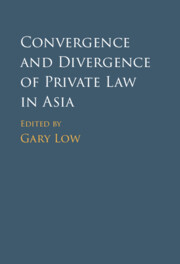Book contents
- Convergence and Divergence of Private Law in Asia
- Convergence and Divergence of Private Law in Asia
- Copyright page
- Dedication
- Contents
- Tables
- Contributors
- Acknowledgments
- Abbreviations
- 1 Introduction
- 2 Uniform Law and the Production and Circulation of Legal Models
- 3 Convergence, Divergence and Diversity in Financial Law: The Experience of the UNCITRAL Model Law and Cross-Border Insolvency
- 4 The New York Convention and the UNCITRAL Model Law on International Commercial Arbitration: Existing Models for Legal Convergence in Asia?
- 5 Convergences and Divergences: Comparing Contractual and Organizational Models in International Regulatory Cooperation
- 6 Law as a Market Standard: Voluntary Unification in Contract and Company Law
- 7 Is the Harmonisation of Asian Contract Law Possible? The Example of the European Union
- 8 The Presumption of Regularity in Chinese Corporate Contracting: Evidence and the Prospect of Regional Convergence
- 9 Mind the Gap: Studying the Implementation Discrepancy for the ASEAN Economic Community
- 10 The Rule of Law as Key to the ASEAN Legal Order: How Can It Be Ensured?
- 11 How Asian Should Asian Law Be?
- Index
5 - Convergences and Divergences: Comparing Contractual and Organizational Models in International Regulatory Cooperation
Published online by Cambridge University Press: 17 February 2022
- Convergence and Divergence of Private Law in Asia
- Convergence and Divergence of Private Law in Asia
- Copyright page
- Dedication
- Contents
- Tables
- Contributors
- Acknowledgments
- Abbreviations
- 1 Introduction
- 2 Uniform Law and the Production and Circulation of Legal Models
- 3 Convergence, Divergence and Diversity in Financial Law: The Experience of the UNCITRAL Model Law and Cross-Border Insolvency
- 4 The New York Convention and the UNCITRAL Model Law on International Commercial Arbitration: Existing Models for Legal Convergence in Asia?
- 5 Convergences and Divergences: Comparing Contractual and Organizational Models in International Regulatory Cooperation
- 6 Law as a Market Standard: Voluntary Unification in Contract and Company Law
- 7 Is the Harmonisation of Asian Contract Law Possible? The Example of the European Union
- 8 The Presumption of Regularity in Chinese Corporate Contracting: Evidence and the Prospect of Regional Convergence
- 9 Mind the Gap: Studying the Implementation Discrepancy for the ASEAN Economic Community
- 10 The Rule of Law as Key to the ASEAN Legal Order: How Can It Be Ensured?
- 11 How Asian Should Asian Law Be?
- Index
Summary
Transnational private regulation (TPR) includes a large number of private regimes that regulate the behaviour of multinational firms and their interaction with investors, consumers, local communities. It consists of regulatory regimes designed and implemented by private actors, often in collaboration with international organisations. TPR standards are voluntary. TPR’s legitimacy is linked to and partly based on its effectiveness. Private and public regulation at transnational level are intertwined and international organizations play a significant function in making TPR effective. The chapter examines these regimes and tries identifying determinants of regulatory convergence and divergence. Convergence may concern procedural and/or substantive standards. Do private transnational regulatory models vary? Are they converging towards common characteristics? What are the factors determining divergences or convergences? The main question concerns the impact of international regulatory cooperation on divergence or convergence of transnational regulatory models. The paper demonstrates a correlation between forms and instruments of cooperation and modes of convergence. Firstly, the analysis shows that conventional comparative methodology used for state laws is unsuitable to compare transnational private regimes. Secondly the determinants of convergence or divergence of transnational regulatory models differ from those affecting the evolutionary patterns of State legal systems.
- Type
- Chapter
- Information
- Convergence and Divergence of Private Law in Asia , pp. 81 - 104Publisher: Cambridge University PressPrint publication year: 2022



